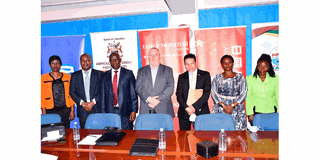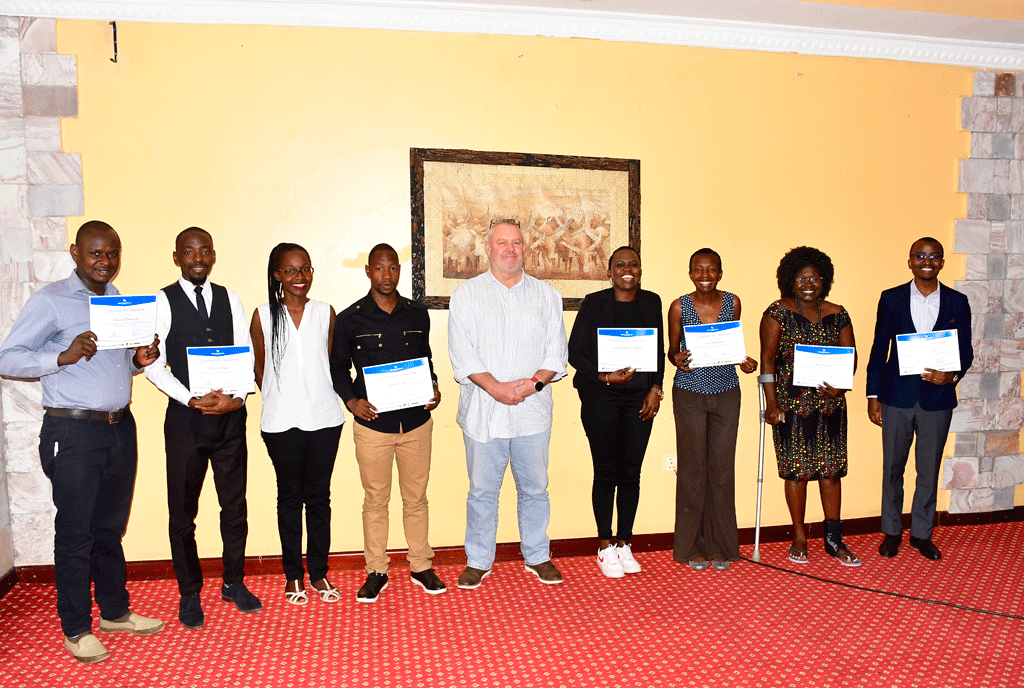Prime
BoU, Chinese embassy inject Shs114m into NMG farm clinics

Mr Tony Glencross, the NMG-Uganda managing director (centre), with representatives of organisations that are sponsoring the 2022 Seeds of Gold Farm Clinics; (L-R) Ms Christine Elong, the public relations officer of Naro, Mr Emma Negombye, the manager Agri-Business at Stanbic Bank, Mr Alex Lwanja, the Bank of Uganda head of Agricultural Credit Facility, Mr Chen Huixin, the deputy Chinese ambassador, Dr Barbara Mugwanya Zawedde, the director Mukono Zonal Agriculture Research Institute, and Ms Jane Kugonza, a senior outreach officer at Naro, at the Monitor Publications head offices on Wednesday. PHOTO/STEPHEN OTAGE
What you need to know:
- Bank of Uganda donated Shs40m while the Chinese embassy Shs74m.
- 60, 000: Number of farmers registered in the farm clinics database since its inception in 2012.
- Shs621b: The Agricultural Credit Facility of Bank of Uganda now up from Shs20b in 2009 following partnership with NMG platforms.
Bank of Uganda, the National Agriculture Research Organisation (Naro) and the Chinese Embassy, have described the Nation Media Group (NMG) Seeds of Gold Farm Clinics as an important platform for transforming agriculture.
The farm clinics equip farmers with the necessary knowledge and support to run profitable agribusiness ventures within their respective regions.
Speaking at the launch of this year’s farm clinics last Wednesday, Mr Chen Huixin, the Chinese deputy ambassador, pledged more support for Seeds of Gold Farm Clinics because they constantly help Ugandan farmers in their greatest needs .
“I express our high respect on the continuous sponsoring of the Seeds of Gold Farm Clinics by NMG and partners for playing a great role in empowering Ugandan farmers and providing training within their areas of need. This is an undertaking that our Embassy is happy to be part of over the years,” he said.
This year, the embassy will contribute about Shs74m towards the purchase of irrigation equipment.
“Agriculture as an art and science of cultivating the soil, growing crops and raising livestock. It is essential for our lives and it is the basis for the social economy because it provides food, fibers, fuel and raw materials for industrial development as well as food for the population and household incomes,” Mr Huixin said.
Mr Alex Lwanja, the Bank of Uganda’s head of Agricultural Credit Facility, who handed over a Shs40m dummy cheque, said since they partnered with NMG platforms to sensitise farmers about availability of cheap agricultural credit, several benefits have been realised, including the growth of the credit facility from Shs20b in 2009 to Shs621b last year.
“There has been increase in employment, agricultural production and agro processing. Success has also been registered in increased Foreign exchange, household income and those engaging in agro-processing,” he said.
Dr Barbara Mugwanya Zawedde, the director of Mukono Zonal Agriculture Research Institute, said the clinics have availed farmers with new technologies.
“Whereas they focused more on food security, they will pay more attention to agro industrialisation under the third national development plan, where they will be working with farmers to produce for the markets,” Ms Mugwanya said.
She added that they will also use the platform to address emerging challenges such as climate change, and popularise urban farming.
Mr Emma Negombye, the manager of agri-business at Stanbic Bank, said their participation in the farm clinics for the last 10 years has been an eye opener.
Mr Tony Glencross the managing director of NMG-Uganda, said since its inception in 2012, the farm clinics have generated a database of 60,000 farmers, which is now an important information source to other farmers.
He said farming and agriculture are crucial employers and bread winners for Ugandans, and NMG happy with what it has achieved so far from the farm clinic which started in 2012.
“In the last two years, four farmers groups acquired irrigation equipment. Bank of Uganda, Stanbic Bank Uganda and NSSF have been instrumental with providing financial support. The Covid situation was a learning situation for food security. Seeds of Gold will have an impact in a short and long term, when climate smart farming is in the hands of Ugandans. It is challenging but manageable,” he said.




